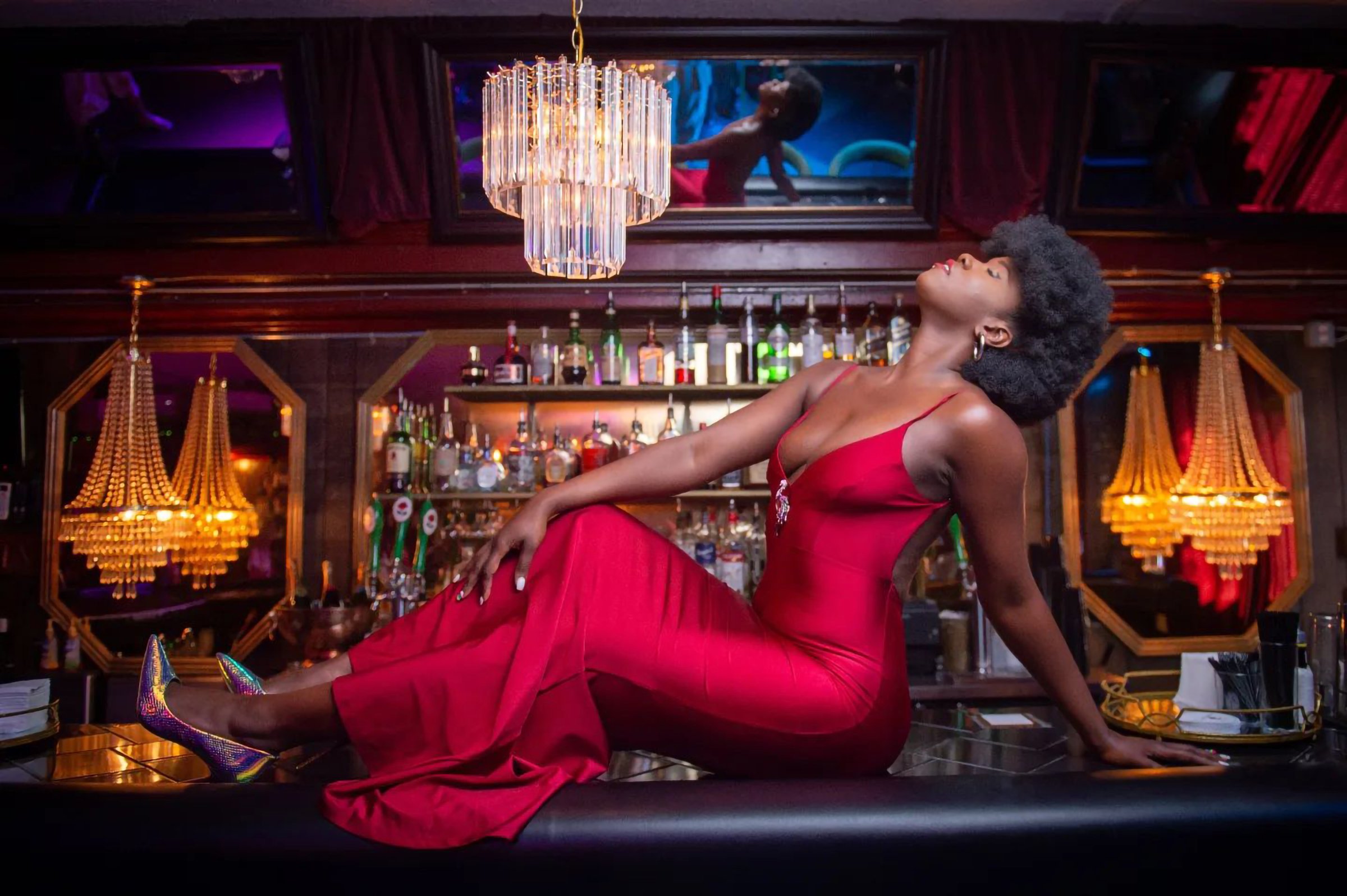Passing Strange is one part rock concert specifically tailored for theatre aficionados, and two parts Broadway play that's particularly accessible to artists and musicians. Incorporating elements from both forms, the show is an autobiographical reminiscence of one young man's search for artistic, ethnic and spiritual identity. Raising some interesting points and issues, the new production at Trustus Theatre never forgets to keep the audience rocking, even as they may ponder larger questions.
The show was written by Stew (the stage name of musician Mark Stewart, i.e. like "Bono" or "Sting"), who also composed the score with Heidi Rodewald; both worked with original stage director Annie Dorsen (who gets an "in collaboration with" credit) to realize Stew's vision. In addition to Stew the real-life author, there is Stew the narrator, played by himself on Broadway and here by Samuel McWhite, and Stew the Youth, played by Mario McClean. The Narrator alternately sings and tells of his formative years as a teen and young adult, as the Youth brings them to life on stage. Sometimes the Narrator, with the perspective and wisdom of a mature adult, explains what the Youth was really thinking; at other times he makes jokes about his younger self's naiveté, or wistfully shares an insight realized too late. Just as often, McClean shows the audience the depth and intensity of a sensitive artist's sorrows, hopes, and joys, as McWhite, backed by a capable 5-piece band (led by Musical Director Tom Beard on keyboards) sings Stew's often witty and self-deprecating lyrics. It's an inventive narrative technique, since one is never quite sure whose perspective is the more accurate.
Both McClean and McWhite (and you couldn't find a more fortuitous combination of names to play different aspects of the same character!) have pleasant, rich voices that easily adapt to the show's meandering journey through musical styles, from rockers to ballads, and McClean displays an impressive vocal range. McClean also captures his character's utter innocence in his mid-teens, then convincingly grows into a gifted, if fairly cocky, young intellectual; meanwhile the world-weary Narrator reminds the audience of the choices he might have made along the way. Towards the show's end, the suffering on his face is palpable McWhite attempts to relay difficult truths; without saying a word, he conveys both reluctant acceptance and defiant denial of the lessons his older self strives to teach.
Stew the composer is a rock guitarist, but shows an impressive mastery of just about every musical form. Some songs, especially those set in the earlier part of his life, are smooth soul, and recall acts like the 5th Dimension. Others are bluesy, with McWhite channeling artists like B. B. King. Later numbers reflect anarchist metal and punk influences; quite a few reminded me of Pete Townshend's softer, piano compositions from his solo projects, and from the classic Tommy, songs like "Welcome" and "Sally Simpson." Stew won a Tony for his book, but not for his score, however, and while all the songs are pleasant enough, there are no "Let the Sun Shine In" anthems to be found. I must note that often his rhymes, while amusing, border on the obvious, and at times can be almost Dr. Seuss-like in their simplicity. Still, that too can be used for good comedic effect, as when every possible rhyme for "keys" is used to describe how a generous, trusting European offers her apartment to the Youth; he compares that with the way a snobby American might reject him, concluding "bitch, please - she gave me her keys."
Katrina Garvin, as Stew's mother, makes the most of her moments on stage. Her voice is just as beautiful as it was in last summer's Smokey Joe's Cafe, and here she gets to show off her acting skills, alternately stern, loving, comical, or a combination of all three. Four performers depict every other character, and one might think there was a hidden ensemble of another dozen singers somewhere. It's just the four, however, and each has one or more meaty character parts. Terrence Henderson, who doubles as choreographer, chews the scenery shamelessly and hilariously as an over-the-top performance artist, while Kanika Moore is at first scary and authoritarian as a nihilist/revolutionary/Bohemian, then softens as we see her genuine affection for the Youth. Her demand that he "have a conversation with the hand!" is just priceless. Avery Bateman gets lots of laughs as a suburban, church-choir princess, then is sweet, appealing and vulnerable as the Youth's Dutch girlfriend, while Kendrick Marion does fine supporting work as assorted friends and colleagues in each of those settings.
One of the show's many ironies is that in a theatre world, and a local theatre community, where good roles for actors of color are hard to find, all of the performers are African-American, yet they spend much of their time convincingly playing Dutch and Germans. And that is another irony: although the search for meaning in life and art is universal, Stew's journey is different than one might expect. A baby boomer born in Los Angeles, he might easily have been one of the children answering James Brown with "I'm black and I'm proud!" Stew, however, is black and ambivalent, verging on (but not quite) self-loathing. Growing up in a traditional, religious, middle-class home, his rebellion is not against 'the man," but against his mother's church, and the societal expectations placed on him by his peers, that as an intellectual, he will naturally gravitate into a Cliff Huxtable-style respectability. Instead, he forms a punk band, then flees first to Amsterdam, then Berlin, where he can find his musical voice. The supreme irony, however, is that in a culture oblivious to his color, the Youth affects an oppressed background that he hasn't completely experienced, compelling his German peers to concede "his ghetto angst is far superior to ours." It's quite a courageous move for the author Stew to admit that to some extent he exploited his own heritage for artistic acceptance, and when the Youth asks (paraphrasing from memory here) if anyone really understands what it's like to struggle on the streets of South Central, the Narrator stops the action, wryly observing that no one in the show, characters or performers, really understands that. The show's title, a quote from Othello that refers to a fascinating, exotic tale, also is a reference to an accusation that just as African-Americans once tried to "pass" for white, for acceptance, so the Youth is passing for ghetto, to be accepted as a performer.
Director Chad Henderson wisely emphasizes the non-theatrical aspects of the play. Bland white drapes suggest the sheltered and clean-cut background of the youth, then open to reveal a Europe represented by vivid abstract paintings, exploding with color and vitality. (Full disclosure: Jasper - The Word on Columbia Arts partnered with Trustus on the original art featured in the production, and all works can be bid on via silent auction though the run of the show. Most of the artists as well as Henderson have been featured in the magazine, and we heartily encourage you to support local art and artists this way. This writer's involvement with all of that, however, has been limited to drinking a beer or two while looking at the paintings, and saying "Wow - cool art.") There is no set, nor is one needed; all action plays out naturally in front of the live band, with the occasional table, chair or hand prop used when necessary. When characters are on stage but not directly involved in a scene, they behave naturally, listening to music on headphones, writing some private composition, or occasionally sharing a joint with the band. Yet when the time comes for a choral number, often you hear their voices while they remain focused on their personal business, seemingly uninvolved in the action. It's a technique we also saw in the recent Spring Awakening, and the result is quite effective. Director, Musical Director, and Choreographer reunite with cast members Bateman and Marion from that show, which explored similar dramatic territory: intellect searching for truth in the midst of youth and sexuality (and Germany!) set to contemporary rock music, and performed by an energetic and talented young cast.
At the recent Jasper release party, I joked with a friend about a review he once got where the critic didn't realize how much she enjoyed the show. She detailed how good the performances were, but griped about the play itself. So skip to the next paragraph if you are interested solely in this specific production's qualities, which are excellent. I must commend Trustus for yet again taking a risk, being adventurous, and producing not one but two bold musical choices in quick succession, both tackling controversial themes via non-traditional storytelling and contemporary rock music. (The composers for both Passing Strange and Spring Awakening were respected but non-mainstream rock artists who transitioned to musical theatre, and both shows premiered within months of each other in New York.) Yet for me, the universality of this show's themes was severely undercut by an unsatisfying conclusion, or lack thereof, a gripe I also made about the generally enjoyable Spring Awakening. The Youth asserts that "life is a mistake that only art can correct," while the ostensibly wiser Narrator cautions him that "song is a bong" (again, those witty but nursery rhyme-ish lyrics) and that what the youth is looking for in life can only be found in art. Which are two sides of the same coin, in a way. The Narrator maintains that love is the highest power of all... but what I longed for was a stronger declaration. Either an extra scene showing wisdom that led the Youth to mature into the Narrator, or a song channeling The Faces' "Oo La La" that clarifies how the Youth will have to learn it all on his own, or an admission that even now, the Narrator doesn't have all the answers. In many ways, I was left with the impression that his former girlfriend, the German nihilist, might still see the author falling prey to the same weakness: mining his own history for immediate effect, in lieu of finding a deeper emotional truth. The ground he covers has been done before, and better, in everything from Tommy and Quadrophenia, to Purple Rain and Pippin. Still, if this was Stew's Portrait of the Artist as a Young Man, I look forward to whatever next project becomes his Ulysses.
That said, the less one has seen the artist's struggle to find his identity depicted on stage before, the more one will marvel at this show's existential themes, acted out live with an accompanying rock band. As above, Passing Strange is theatre for non-theatre-goers, pop music with an intellectual edge, an art exhibition with music and lyrics. Go for the art, go for the talented cast, and go because this sort of show, one that addresses timeless yet intangible questions while actually entertaining you, just isn't done often enough in Columbia. Passing Strange runs through April 14th; call the Trustus box office at 254-9732 for ticket information.
~ August Krickel



